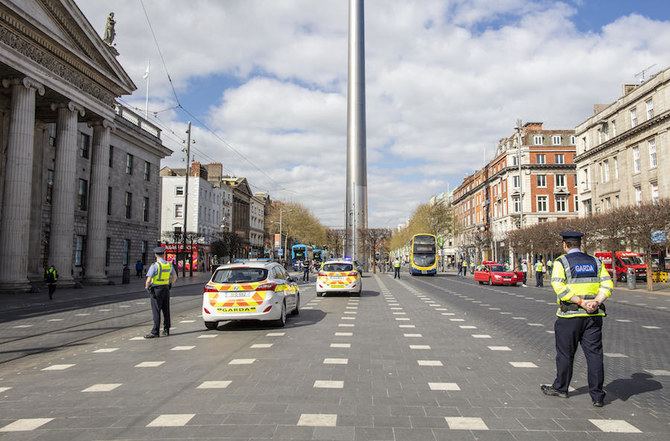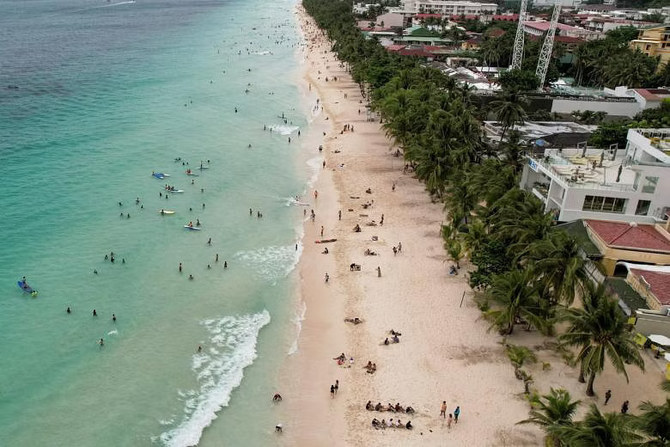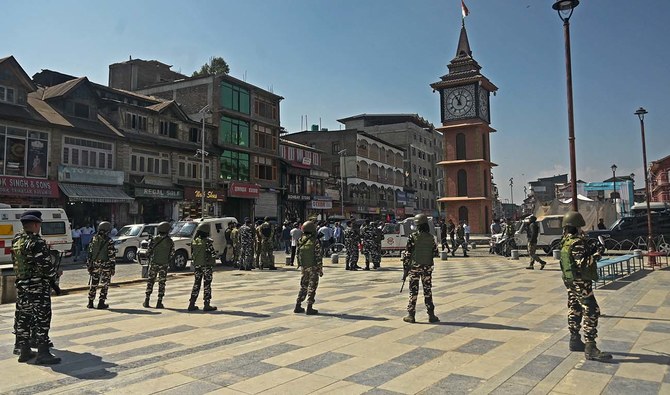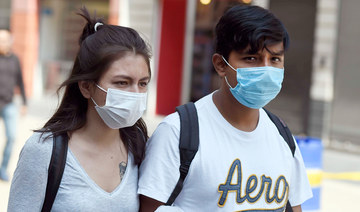CHICAGO: The coronavirus pandemic that has crippled big-box retailers and mom and pop shops worldwide may be making a dent in illicit business, too.
In Chicago, one of America’s most violent cities, drug arrests have plummeted 42% in the weeks since the city shut down, compared with the same period last year. Part of that decrease, some criminal lawyers say, is that drug dealers have no choice but to wait out the economic slump.
“The feedback I’m getting is that they aren’t able to move, to sell anything anywhere,” said Joseph Lopez, a criminal lawyer in Chicago who represents reputed drug dealers.
Overall, Chicago’s crime declined 10% after the pandemic struck, a trend playing out globally as cities report stunning crime drops in the weeks since measures were put into place to slow the spread of the virus. Even among regions that have the highest levels of violence outside a war zone, fewer people are being killed and fewer robberies are taking place.
Still, law enforcement officials worry about a surge of unreported domestic violence, and what happens when restrictions lift — or go on too long.
It’s rare for a city to see a double-digit drop in crime, even over a much longer period. During New York City’s 1990s crime decline, one of the biggest turnarounds in American history, crime dropped about 40% over three years. That makes the drop-offs occurring now — in a period of just a couple of weeks — even more seismic.
Across Latin America, crime is down to levels unseen in decades.
“Killings are down, and the gangsters aren’t harassing so much,’’ Eduardo Perdomo, a 47-year-old construction worker, said while getting off a bus in San Salvador. “I think they’re afraid of catching the virus, and they aren’t going out.’’
El Salvador reported an average of two killings a day last month, down from a peak of 600 a day a few years ago.
Much of the decrease has taken place because of tougher security policies and gang truces. But the imposition of near-total limits on movement is likely driving it down further, according to analysts and national statistics.
In Peru, where crime levels fell 84% last month, Lima mortician Raúl González usually has as many as 15 bodies a day — many are homicide victims. This week he napped on a bench after six hours without a client.
“There are almost no killings or car accidents these days,’’ González said.
In South Africa, police reported a stunning decline during their first week of lockdown measures. Police Minister Bheki Cele said reported rapes were down from 700 to 101 over the same period last year. Serious assault cases plummeted from 2,673 to 456, and murders fell from 326 to 94.
The US virus epicenter in New York saw major crimes — murder, rape, robbery, burglary, assault, grand larceny and car theft — decrease by 12% from February to March. In Los Angeles, 2020 key crimes statistics were consistent with last year’s figures until the week of March 15, when they dropped by 30%.
“There’s a lot fewer opportunities for criminals to take advantage of,” said Joe Giacalone, a former New York Police Department sergeant who now teaches at John Jay College of Criminal Justice. “Most burglars, they wait for you to leave the house.”
Policing has also changed in the face of the pandemic. Officers are increasingly getting sick; the NYPD, the country’s largest department with more than 36,000 officers, has more than 7,000 officers out and more than 2,000 diagnosed with COVID-19.
And US authorities say they’re issuing citations instead of making low-level arrests, policing social distancing and putting detectives into patrol cars — which could, in turn, bring down crime rates.
While departments are unlikely to announce they’ve backed off policing certain crimes, “that’s going to be the case,” said Bowling Green State University criminologist Philip Stinson.
“In many respects, over the next weeks, they’re really in survival mode,” he said.
But while narcotics arrests are down, drug sales continue, with dealers likely forced to change their strategies, said Rodney Phillips, a former gang member in Chicago who now works as a conflict mediator in the city.
“These guys already face poverty and death in these areas,” he said. “They might be selling more online now. But they aren’t going to give up just because of the coronavirus.”
A Maryland man accused of operating a Darknet store selling prescription opioids boasted on his vendor page: “Even with Corona Virus the shop is running at full speed.”
He told an undercover FBI agent he was just waiting for a shipment because “this corona virus (sic) is (expletive) up inventory,” according to court documents.
Other crimes, however, may be fueled by shutdown orders.
Houston Police Chief Art Acevedo said the city’s aggravated assaults were up 10% in the last three weeks, and half of those were domestic violence, a significantly higher proportion than normal. Calls to Missouri’s child abuse and neglect hotline dropped by half as the virus first struck the state. Advocates said the calls aren’t made because the kids aren’t in school.
And Chicago did see a spike in gun violence this week, according to the Chicago Sun-Times, which reported 60 shootings — 19 fatal — between Sunday and Thursday.
San Jose, California, Police Chief Eddie Garcia hopes the downward trend will continue after the pandemic is over. But his officers are preparing for the worst.
“The longer we’re in a lockdown,” he said, “the more we’re playing with fire.”
For most people, the coronavirus causes mild or moderate symptoms, such as fever and cough. But for others, especially older adults and people with health problems, it can cause severe symptoms like pneumonia. More than 1.5 million cases have been diagnosed worldwide.
Crime drops around the world as COVID-19 keeps people inside
https://arab.news/9gvdp
Crime drops around the world as COVID-19 keeps people inside

- Across Latin America, crime is down to levels unseen in decades
- Even among regions that have the highest levels of violence outside a war zone, fewer people are being killed and fewer robberies are taking place
Philippines seeks to position itself as top tourism destination at Arabian Travel Market

- Philippines has recorded 10 percent increase in visitors arriving from Gulf countries this year
- The country wants to become a preferred destination in Asia and the world
MANILA: The Philippines is working to attract more visitors from the Middle East and position itself as a preferred destination for international travelers, its tourism stakeholders said ahead of the Arabian Travel Market in Dubai.
More than 2,300 exhibitors and delegates from over 165 countries are joining the annual Arabian Travel Market, which this year will take place from May 6 to 9 at the Dubai World Trade Center.
In the Philippines, known for its white sandy beaches, diving spots and diverse culture, tourism is a key sector, contributing nearly 13 percent, or about $44 billion, to its gross domestic product in 2019.
The Department of Tourism will be leading the Philippine delegation in Dubai, as officials set their eyes on promoting the country’s best tourism to the international market.
“We look forward to these opportunities to share the Filipino story to the rest of the world … and to reinforce the Philippines’ position as a preferred destination and top-of-mind choice for travelers,” Secretary of Tourism Christina Garcia Frasco said in a statement.
With its participation at the Arabian Travel Market, the Philippines hopes to sustain the momentum from increased tourist arrivals from the Middle East, she added.
The Philippine tourism industry will not only promote their strengths, such as their tropical and natural attractions, but also diverse offerings in gastronomy and culture, as well as the Filipino tourism workers, “who serve as our best asset for their distinct hospitality and warmth,” Frasco said.
The Philippines has welcomed more 2 million international travelers since the beginning of the year, according to data from the tourism department. This includes a 10 percent increase in visitors arriving from Gulf countries, especially Saudi Arabia and the UAE, which has been among the Philippine government’s key emerging-market targets.
“There’s been a remarkable surge in outbound tourism from the Middle East, particularly from Gulf Cooperation Council countries … We see a growing appetite for international travel among GCC citizens and we see this trend continuing to rise in the coming years,” said Maria Margarita Montemayor Nograles, chief operating officer of the Tourism Promotions Board.
“This is one of the major reasons why we are doubling down on our efforts to maintain and enhance our presence in the Middle East. With our continued participation at the ATM, we aim to position the Philippines as a top-of-mind destination in Asia.”
Tourists from the Middle East are growing more important for some Filipino tourism operators, and represent a significant segment of their clientele, said Manih Karay, president of CTPH Tour.
“To appeal to tourists from Arab countries and promote the Philippines, we highlight the country’s natural beauty, rich cultural heritage, and warm hospitality … Their interest in exploring new destinations and cultural experiences aligns well with our commitment to providing inclusive and diverse travel services,” Karay told Arab News.
Arab tourists also contribute to the growth of the Philippines’ tourism industry, Karay said, adding that they foster cultural exchange and economic development.
“Their visits not only enrich our travel experiences but also promote mutual understanding and appreciation among different cultures,” she said.
Suspected Kashmir rebels kill Indian air force corporal

- Suspected rebels ambushed military convoy in Indian-administered Kashmir, Indian Air Force says
- Since 1989, rebel groups opposed to Indian rule have waged insurgency in disputed territory
SRINAGAR, India: An Indian air force member was killed and four more injured when suspected rebels ambushed a military convoy in Indian-administered Kashmir, an official statement said, as campaigning for national elections continues in the disputed territory.
The convoy was attacked by an unknown number of armed militants who sprayed automatic rifle fire toward at least one air force truck in the mountainous Poonch area, 200 kilometers (124 miles) south of the main city of Srinagar, the air force said in a statement.
Five air force personnel were hit in the firefight late Saturday and “one Air Warrior succumbed to his injuries later,” it said, identifying the dead man as a corporal.
A neighboring constituency took part in the first phase of India’s general election on April 19, and Poonch voters were originally scheduled to cast their ballots this week but the Election Commission of India has postponed the polling to May 25 because of inclement weather in recent days.
Kashmir has been divided between India and Pakistan since their independence in 1947, with both claiming the high-altitude territory in full but administering it in parts.
Since 1989, rebel groups opposed to Indian rule have waged an insurgency in Indian-controlled Kashmir, demanding either independence or a merger with Pakistan.
The conflict has left tens of thousands of civilians, soldiers and militants dead.
Rebel activity in the territory has registered an uptick since last month as campaigning for the elections picked up in the restive region.
In April, three suspected rebels were killed and a police officer and three soldiers wounded in three separate clashes across the territory.
Violence has drastically dropped since 2019, when Prime Minister Narendra Modi’s government revoked the region’s limited autonomy and stepped up a security chokehold.
Voting in India’s six-week-long national election, which started last month, will end on June 1.
Driver dies after crashing into White House perimeter gate, Secret Service says

- The driver was not immediately identified
WASHINGTON: A driver died after crashing a vehicle into a gate at the White House Saturday night, authorities said.
The driver was found dead in the vehicle following the crash shortly before 10:30 p.m. at an outer perimeter gate of the White House complex, the US Secret Service said in a statement.
Security protocols were implemented but there was no threat to the White House, the agency said.
The driver was not immediately identified.
The Secret Service will continue to investigate the matter, while turning over the fatal crash portion of the investigation to the Washington Metropolitan Police Department, the agency said.
Fake videos of Modi aides trigger political showdown in India election

- Indian police arrest nine people for circulating fake video of Indian Home Minister Amit Shah
- With more than 800 million Internet users, tackling misinformation in India is a huge challenge
BENGALURU/LUCKNOW: Manipulated videos are taking center stage as campaigning heats up in India’s election, with fake clips involving two top aides of Prime Minister Narendra Modi triggering police investigations and the arrest of some workers of his rival Congress party.
In what has been dubbed as India’s first AI election, Modi said last week fake voices were being used to purportedly show leaders making “statements that we have never even thought of,” calling it a conspiracy “to create tension in society.”
Indian police — already investigating the spread of fake videos showing Bollywood actors criticizing Modi — are now investigating a doctored online clip that showed federal home minister Amit Shah saying the ruling Bharatiya Janata Party will stop certain social guarantees for minorities, a subject sensitive for millions of voters.
Shah retorted on X, posting his “original” and the edited “fake” speech and alleging — without providing any evidence — that the main opposition Congress was behind the video it created to mislead the public. The minister said “directions have been issued to the police to address this issue.”
Indian police arrested at least nine people, including six members of Congress’ social media teams, in the states of Assam, Gujarat, Telangana and New Delhi last week for circulating the fake video, according to police statements.
Five of the Congress workers were released on bail, but the most high-profile arrest made by the cybercrime unit of New Delhi police came on Friday, when they detained a Congress national social media coordinator, Arun Reddy, for sharing the video. New Delhi is one region where Shah’s ministry directly controls police. Reddy has been sent into three-day custody.
The arrest has sparked protests from Congress workers with many posting on X using the #ReleaseArunReddy tag. Congress lawmaker Manickam Tagore said the arrest was an example of “authoritarian misuse of power by the regime.”
Congress’ head of social media, Supriya Shrinate, did not respond to messages and an email seeking comment.
MISINFORMATION
India’s election from April 19 to June 1 will be the world’s largest democratic event. With nearly a billion voters and more than 800 million Internet users, tackling the spread of misinformation is a high stakes job. It involves round-the-clock monitoring by police and election officials who often issue take down orders to Facebook and X as investigations start.
In India’s most populous state of Uttar Pradesh, more than 500 people keep tabs on online content, flagging controversial posts and coordinating with social media companies for their removal when needed, police chief Prashant Kumar told Reuters on Saturday.
Another fake video that sparked a storm last week showed Yogi Adityanath, the state’s chief minister, criticizing Modi for not doing enough for families of those who died in a 2019 militant attack. Though fact checkers said the video was created using different parts of an original clip, state police called it an “AI generated, deepfake.”
Using Internet address tracking, state police arrested a man named Shyam Gupta on May 2 who had shared the fake video post on X a day earlier, receiving over 3,000 views and 11 likes.
The police have accused Gupta of forgery and promoting enmity under Indian law provisions that can carry a jail term of up to seven years if convicted. Reuters could not reach him as he is currently serving a 14-day custody period.
“This person is not a tech guy. Had he been tech savvy, arresting him quickly would not have been possible,” said police officer Kumar.
Australian police shoot boy dead after stabbing with ‘hallmarks’ of terrorism

SYDNEY,: Australian police said on Sunday they had shot dead a boy after he stabbed a man in Western Australia’s capital Perth, in an attack authorities said indicated terrorism.
There were signs the 16-year-old, armed with a kitchen knife, had been radicalized online, state authorities said, adding they received calls from concerned members of the local Muslim community before the attack, which occurred late on Saturday night.
The attack, in the suburb of Willetton, had “hallmarks” of terrorism but was yet to be declared a terrorist act, police said.
“At this stage it appears that he acted solely and alone,” Western Australia Premier Roger Cook told a televised press conference in the state capital Perth, regarding the attacker.
The victim, stabbed in the back, was stable in hospital, authorities said.
Prime Minister Anthony Albanese said he had been briefed on the incident by police and intelligence agencies, which advised there was no ongoing threat.
“We are a peace-loving nation and there is no place for violent extremism in Australia,” Albanese said on social media platform X.
The incident comes after New South Wales police last month charged several boys with terrorism-related offenses in investigations following the stabbing of an Assyrian Christian bishop while he was giving a live-streamed sermon in Sydney, on April 15.
The attack on the bishop came only days after a stabbing spree killed six in the Sydney beachside suburb of Bondi.
Gun and knife crime is rare in Australia, which consistently ranks among the safest countries in the world, according to the federal government. (Reporting by Sam McKeith in Sydney; Editing by Christian Schmollinger and William Mallard)
















